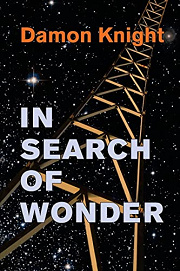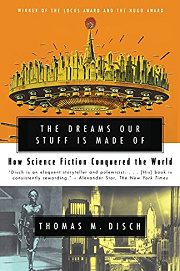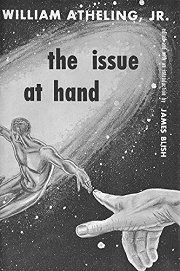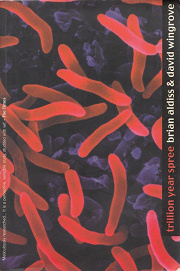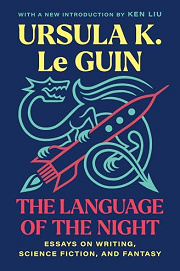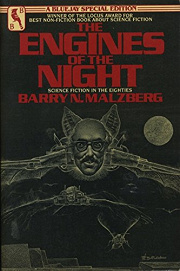Share your thoughts in a quick Shelf Talk!
In Search of Wonder by Damon Knight
From pulp rockets to the golden age’s brightest minds, a legendary critic maps the terrain of a genre coming into its own. Insightful and incisive, In Search of Wonder is a landmark exploration for anyone curious about how science fiction learned to soar.
Have you read this book? Share what you liked (or didn’t), and we’ll use your answers to recommend your next favorite read!
Love In Search of Wonder but not sure what to read next?
These picks are popular with readers who enjoyed this book. Complete a quick Shelf Talk to get recommendations made just for you! Warning: possible spoilers for In Search of Wonder below.
In In Search of Wonder, did you enjoy ...
... acerbic, iconoclastic critiques of SF’s sacred cows and Golden Age myths?
The Dreams Our Stuff Is Made Of by Thomas M. Disch
If what hooked you in In Search of Wonder was Knight’s barbed dissections—like his scathing takes on Golden Age plotting and the overreach of magazine-era hype—you’ll love Disch’s fearless broadside. He skewers the field’s self-mythologizing with the same gleeful precision, calling out sloppy thinking and cultural blind spots while celebrating the few works that genuinely earn their awe. It’s that same mix of wit, erudition, and no‑nonsense standards—just aimed at the genre’s biggest myths.
... sharp, witty line-by-line reviews that puncture sloppy plotting and prose?
The Issue at Hand by William Atheling, Jr. (James Blish)
You enjoyed how Knight could fillet a novel with a single well-aimed sentence and then back it up with close reading—think of his takedowns of muddled logic and hand‑waving science. Blish (writing as William Atheling, Jr.) brings the same surgical wit, coining terms like the “idiot plot” and walking you through exactly why a scene or argument fails. If Knight made you grin while he sharpened your critical eye, The Issue at Hand will feel like a masterclass in the same key.
... big-picture history that contextualizes authors, magazines, and movements with rigorous argument?
Trillion Year Spree: The History of Science Fiction by Brian W. Aldiss and David Wingrove
Knight’s essays don’t just review books—they map the ecosystem of SF: magazines like Astounding and Galaxy, editorial influence, and how certain writers bent the field. Aldiss and Wingrove scale that instinct up to a sweeping history, tracing how ideas evolved from Wells through the Campbell era and beyond. If you liked how Knight connected specific works to larger currents, Trillion Year Spree gives you the panoramic, deeply argued version.
... thoughtful essays probing what SF/F is for—its ethics, metaphors, and meanings?
The Language of the Night by Ursula K. Le Guin
Where Knight asks fiction to mean something and to say it well, Le Guin answers with essays that interrogate style, purpose, and responsibility in the fantastic. Pieces like “From Elfland to Poughkeepsie” examine why prose registers matter in fantasy, while others unpack how metaphors in SF carry moral weight. If Knight’s standards and seriousness about meaning resonated with you, The Language of the Night is that same rigor filtered through a writer–philosopher’s lens.
... bite-sized, field-level essays and portraits that blend criticism with insider memoir?
The Engines of the Night by Barry N. Malzberg
If you liked Knight’s essay-by-essay rhythm—moving from a scorching review of a Golden Age novel to a meditation on magazine culture—Malzberg’s compact pieces will hit the spot. He offers candid snapshots of editors like John W. Campbell and Frederik Pohl, the grind of the markets, and how certain celebrated works wobble under scrutiny. It’s the same incisive, short-form autopsy of the field—with added insider war stories.
Unlock your personalized book recommendations! Just take a quick Shelf Talk for In Search of Wonder by Damon Knight. It’s only a few questions and takes less than a minute.
